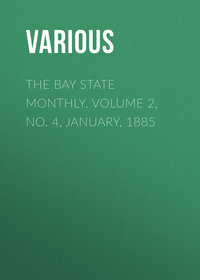Kitabı oku: «The Bay State Monthly. Volume 2, No. 4, January, 1885», sayfa 2
Various
Bir şeyler ters gitti, lütfen daha sonra tekrar deneyin
Türler ve etiketler
Yaş sınırı:
0+Litres'teki yayın tarihi:
01 aralık 2018Hacim:
140 s. 1 illüstrasyonTelif hakkı:
Public Domain